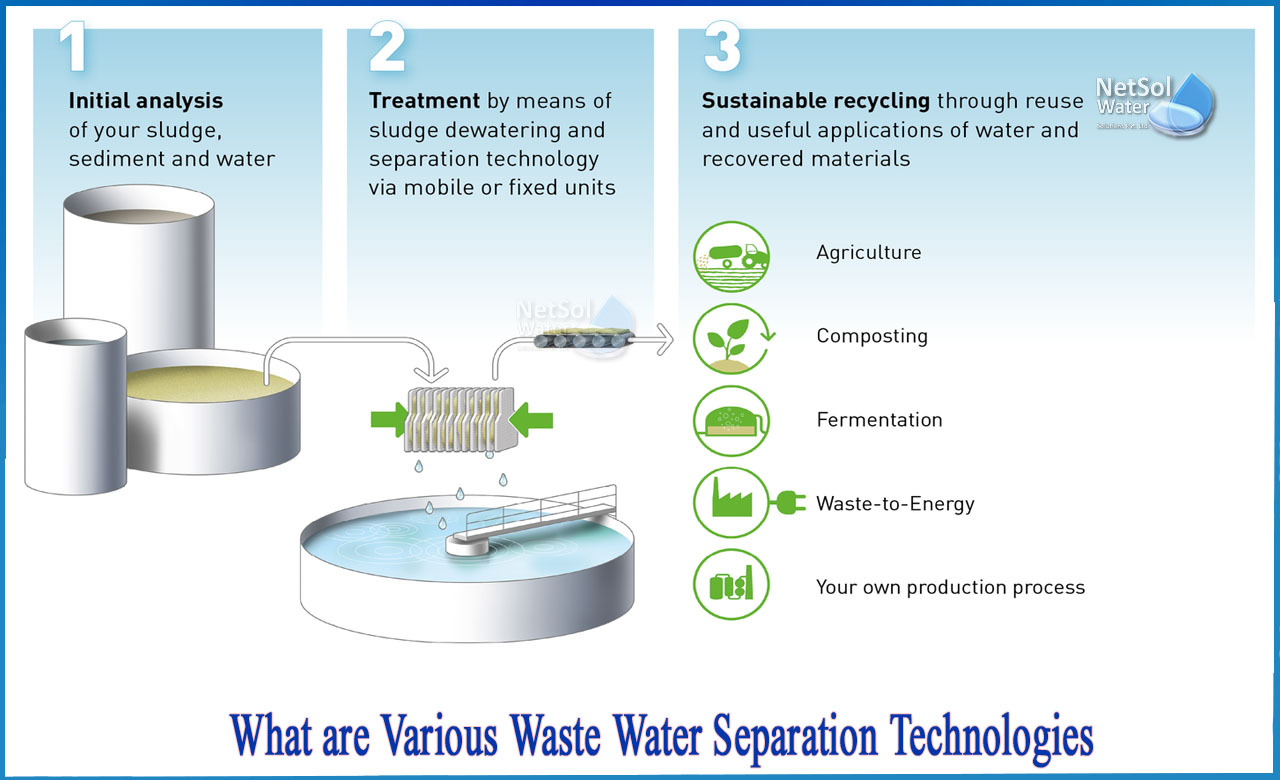What are various Waste water separation technologies?
Separation Technology is the method of combining colloidal particles and extremely small solid suspensions in a wastewater stream into bigger agglomerates that may be separated using sedimentation, flocculation, filtration, centrifugation, or other processes.
What is a Sedimentation tank?
A sedimentation tank is also recognised as a settling tank or clarifier which is a component of wastewater treatment system. A sedimentation tank enables suspended particles in water or wastewater to settle out as it passes slowly through the tank, giving some filtration. At the bottom of the tank, a layer of accumulated solids known as sludge accumulates and is typically extracted. Coagulants are added to drinking-water treatment prior to sedimentation to aid the settling process, which is then followed by filtration and other treatment stages. To boost purifying efficiency in modern sewage treatment, primary sedimentation must be followed by secondary treatment (e.g., trickling filter or activated sludge). Large items and coarse materials are normally eliminated before sedimentation using bar screens and grit chambers.
What is Flocculation?
Flocculation is a water treatment technology that includes solids forming bigger clusters, or flocs that are then eliminated from the water. This process can take place naturally or with the assistance of chemical agents. It is a widely used process for stormwater treatment, wastewater treatment, and drinking water purification.
The elimination of suspended particles is one of the standards for treated water leaving wastewater treatment plants. Small solid particles alter the colour of water and transport contaminants into natural water sources such as rivers and the ocean.
The amount of phosphorus in wastewater must also be restricted, as phosphorus released into rivers stimulates algae growth. Uncontrolled phosphorus emissions have been known to kill off large numbers of fish and other aquatic life.
Some industrial processes produce significant quantities of phosphorus in their effluent, necessitating pre-treatment before discharge to wastewater treatment plants.
What is the process of Filtration?
Filtration is defined as "a mechanical or physical action that separates particles from liquids by passing only the fluid through a media." The separation is not perfect; some fluid will pollute the solids, and the filtrate will contain tiny particles (depending on the pore size and filter thickness). A quick sand filter varies from a slow sand filter in a number of ways, not the least of which being filtration speed and flow rate.
In contrast to the biological mechanism used by slow sand filters, quick sand filtration is essentially a physical process. Rapid sand filters could employ gravity drainage or apply high pressure to the water flows to push it through the system. Because a fast sand filter is essentially physical, it usually necessitates some biological pre- and post-treatment. Coagulation with flocculation is one of them, as is the use of chlorine to assure disinfection. In addition, unlike the slow sand filter, the quick sand filter's construction and operation are both complicated and costly.
What do you mean by Centrifuges?
With continuous and space-saving dewatering methods paired with great efficiency, centrifuges are designed to separate solids from sludge mixes. Sludge dewatering in wastewater treatment plants is a common use.
Electric motors operate the centrifuge's whirling sections, the drum and scroll, which are controlled by two inverters and managed by software.
This setup allows for the automatic and continuous management and adjustment of the drum-scroll differential speed in response to the incoming flow, as well as a consistent proportion of dry solid output and significant energy savings.
Conclusion
Separation technology is used for waste water treatment.To retain particles in suspension, or even dissolved chemicals, from a fluid, a variety of separation technologies can be applied.
Netsol Water is India's leading manufacturer of waste water treatment equipment. For your services, Netsol has the optimum marketability. As a result, choose Netsol waste water technology for the best waste water treatment at your location.
Netsol Water is Greater Noida-based leading water & wastewater treatment plant manufacturer. We are industry's most demanding company based on client review and work quality. We are known as best commercial RO plant manufacturers, industrial RO plant manufacturer, sewage treatment plant manufacturer, Water Softener Plant Manufacturers and effluent treatment plant manufacturers. Apart from this 24x7 customer support is our USP. Call on +91-9650608473, or write us at enquiry@netsolwater.com for any support, inquiry or product-purchase related query.



